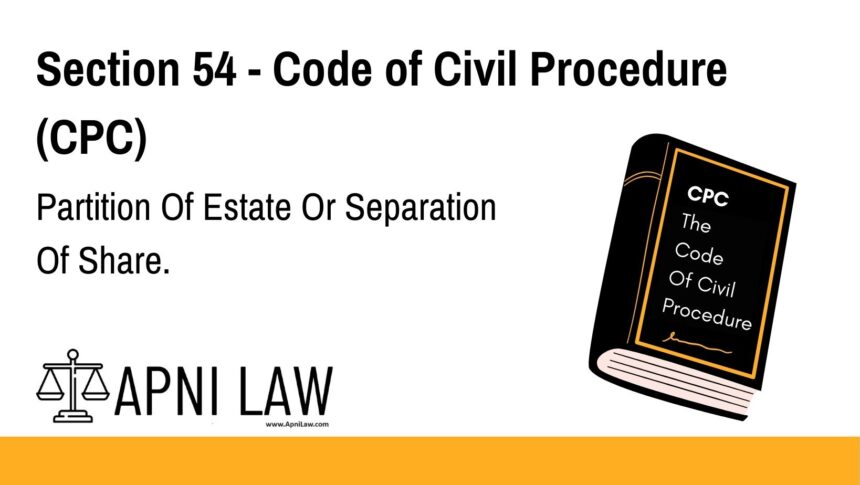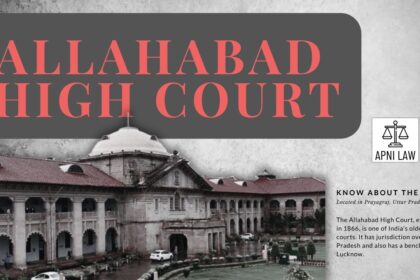Code
CPC Where the decree is for the partition of an undivided estate
assessed to the payment of revenue to the Government, or for the separate possession of a share of such an estate,
the partition of the estate or the separation of the share shall be made by the Collector or any gazetted subordinate
of the Collector deputed by him in this behalf, in accordance with the law (if any) for the time being in force
relating to the partition, or the separate possession of shares, of such estates.STATE AMENDMENTSKarnataka.–For Section 54, the following Section shall be substituted, namely.–“54. Partition of estate or separation of share.–Where the decree is for the partition of an
undivided estate assessed to the payment of revenue to the Government, or for the separate possession of
a share of such an estate, the partition of the estate or the separation of the share of such an estate shall be
made by the Court in accordance with the law if any, for the time being in force relating to the partition or
the separate possession of shares, and if necessary on the report of a revenue officer, not below the rank
of Tahsildar or such other person as the Court may appoint as Commissioner in that behalf.”[VideKarnataka Act 36 of 1998, sec. 2.]
Perfect — this is Section 54 of the CPC (Partition of estate or separation of share). I’ll draft the SEO-optimized article in the same structure we’ve been using (Code → Explanation → Illustration → Q&A → Conclusion), while also mentioning the Karnataka State Amendment.
Section 54 CPC: Partition of Estate or Separation of Share
Code: Section 54 CPC
Partition of Undivided Estate Assessed to Revenue
54.
Where the decree is for the partition of an undivided estate assessed to the payment of revenue to the Government, or for the separate possession of a share of such an estate, the partition of the estate or the separation of the share shall be made by the Collector or any gazetted subordinate of the Collector deputed by him in this behalf, in accordance with the law (if any) for the time being in force relating to the partition, or the separate possession of shares, of such estates.
State Amendments
Karnataka:
For Section 54, the following Section shall be substituted:
“54. Partition of estate or separation of share.—Where the decree is for the partition of an undivided estate assessed to the payment of revenue to the Government, or for the separate possession of a share of such an estate, the partition of the estate or the separation of the share of such an estate shall be made by the Court in accordance with the law, if any, for the time being in force relating to the partition or the separate possession of shares, and if necessary, on the report of a revenue officer, not below the rank of Tahsildar, or such other person as the Court may appoint as Commissioner in that behalf.”
[Vide Karnataka Act 36 of 1998, sec. 2]
Explanation of Section 54 CPC
Section 54 CPC deals with decrees involving partition of undivided estates that are subject to payment of land revenue to the Government. Instead of the Civil Court carrying out the actual partition, the responsibility is placed on the Collector (a revenue authority) or a gazetted subordinate deputed by him.
This is because partition of revenue-paying estates involves not just private rights but also public revenue implications. Revenue authorities are better equipped to ensure that land records, revenue rolls, and shares are adjusted according to law.
Karnataka Amendment
The State of Karnataka has modified Section 54. Instead of the Collector, the Civil Court itself is empowered to effect partition, though it may seek assistance from a revenue officer (not below Tahsildar) or appoint a Commissioner.
Illustration
Example 1: Partition of Agricultural Land
A decree is passed for partition of agricultural land that pays revenue to the Government. Under Section 54 CPC, the Civil Court does not carry out the partition itself. Instead, it directs the Collector to partition the estate and allocate separate shares.
Example 2: Karnataka Position
In Karnataka, if the same decree is passed, the Civil Court undertakes the partition process, with assistance from a Tahsildar or a Commissioner appointed for this purpose.
Common Questions and Answers on Section 54 CPC
1. Who carries out the partition under Section 54 CPC?
- The Collector or a gazetted subordinate deputed by him carries out the partition, not the Civil Court.
2. Why is the Collector involved in partition cases?
- Because partition of revenue-paying estates affects not only private parties but also government revenue, making it necessary for revenue authorities to oversee the process.
3. What is the difference in Karnataka after the amendment?
- In Karnataka, the Civil Court itself conducts the partition, though it may rely on a Tahsildar’s report or appoint a Commissioner.
4. Does Section 54 CPC apply to urban property?
- No. Section 54 specifically applies to revenue-paying estates (typically agricultural land). Partition of urban property is dealt with directly by the Civil Court through a Commissioner under Order 20 Rule 18 CPC.
Conclusion
Section 54 CPC ensures that partition of revenue-paying estates is carried out by revenue authorities like the Collector, since they are best placed to handle the implications on government records and revenue collection. The Karnataka amendment empowers Civil Courts to effect such partitions directly, reflecting a State-specific procedural difference.
For more detailed insights on partition suits and execution of decrees, visit ApniLaw.








